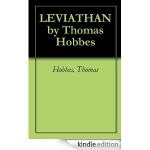|
This section contains 399 words (approx. 1 page at 400 words per page) |

|
Leviathan Summary & Study Guide Description
Leviathan Summary & Study Guide includes comprehensive information and analysis to help you understand the book. This study guide contains the following sections:
This detailed literature summary also contains Topics for Discussion and a Free Quiz on Leviathan by Thomas Hobbes.
The Leviathan is Hobbes' premiere political philosophical work. It states that people are naturally concerned with themselves and with attaining power. While there are laws of nature that can help people live harmoniously, there is not a natural enforcing mechanism for them. Therefore, those that choose to follow them run the risk of being violated or abused by people that do not follow the rules. The only way people can live peacefully together and avoid complete chaos in nature is to voluntarily give up part of their freedom and live under the power of a sovereign, or leader, in a commonwealth. Hobbes explains the mental and social processes people go through when choosing a sovereign and the additional benefits gained by signing away part of their freedom.
Once people enter into the covenant, or contract, of a commonwealth, they are subjected to the laws their sovereign makes. The sovereign has the right and responsibility to write all the laws he feels are necessary and important to the safety of the people. The sovereign always has to think of the best way to distribute justice and cannot act simply on his own desires. His success establishes the success of the nation and if he does not do his job the right way, the nation can dissolve and rot. Hobbes writes how the commonwealth is representative of an artificial man and how such things such as vainglory, too much liberty, or inadequate protection can lead to the destruction of the nation.
After establishing the main ideas of the commonwealth, Hobbes adds the layer of Christianity and the divine rules that people should follow if they want to get into the Kingdom of God. The main rules are that everyone should obey their sovereign, and should believe in Jesus Christ. These rules are repeated several times throughout the book. Non-believers, or those who fail to obey their sovereign, violate both divine and civil law and will be damned to the Kingdom of Darkness.
The Kingdom of Darkness is the last part of Hobbes' Leviathan. It informs people of the Scriptural evidence of hell and what the damned can expect, though none of it is confirmed. He writes about false ideas of demons, incantations and other cultural myths, made popular by the Church of Rome, and finishes with his personal views of some great Greek philosophers and their inconsistencies.
Read more from the Study Guide
|
This section contains 399 words (approx. 1 page at 400 words per page) |

|



